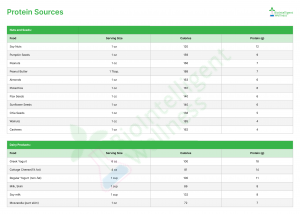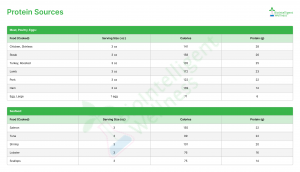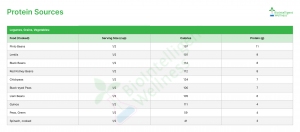Welcome to our discussion of protein’s critical role for Semaglutide users. Semaglutide, such as Ozempic, is widely known for its efficacy in diabetes management and weight control. The medication’s success is further complimented by our dietary choices. It is important to understand how specific nutrients, particularly protein, play into this dynamic. With this article, we aim to shed light on the pivotal role of protein for individuals on Ozempic. Our goal is to provide not only an understanding of why protein is important but also highlight its benefits that extend beyond medication usage. Whether you’re navigating the nuances of managing diabetes or striving for effective weight management with Ozempic, this discussion will equip you with knowledge and practical tips, emphasizing how protein can significantly enhance your health journey.
Join us as we dissect the science behind protein and Ozempic, offering practical insights into integrating optimal protein levels into your diet. We aim to transition from understanding the ‘why’ to mastering the ‘how’ of protein intake, ensuring that every meal is a step towards a healthier, more balanced lifestyle with Ozempic. Let’s begin this enlightening journey together, tailored to empower you with knowledge and practical strategies for your dietary planning.
Understanding Protein Needs
Protein is not just a nutrient, it’s a cornerstone of a healthy, functioning body. It is imperative for building muscle, repairing tissue, and supporting a robust immune system. For those on Ozempic, understanding and managing protein intake becomes even more critical.
Adequate protein intake is particularly necessary for weight management, a common goal for Ozempic users. One of the challenges when losing weight is the potential loss of muscle mass. This is where protein steps in as a hero. It helps preserve lean muscle mass as you shed pounds. Preserving muscle mass is not just about aesthetics; it’s critical for keeping your metabolism active and efficient, as muscle tissue burns more calories than fat tissue. To effectively determine your protein needs, consider your age, gender, physical activity level, and specific health goals. For instance, if you are more active, your protein requirements might be higher to support muscle repair and growth. Similarly, our bodies need more protein as we age to maintain muscle mass and strength.
A well-rounded approach to protein intake typically involves a blend of animal and plant-based sources. Animal proteins, such as lean meats, fish, and dairy products, provide a rich and complete profile of essential amino acids necessary for muscle growth and repair. On the other hand, plant-based proteins like beans, lentils, and nuts, although sometimes lower in one or more essential amino acids, contribute additional health benefits such as fiber, which is beneficial for blood sugar control. Incorporating a variety of protein sources within your diet ensures a comprehensive spectrum of amino acids and a diverse range of nutrients that support blood sugar and metabolism functions.
Grasping the vital significance of protein in your weight loss journey while using Ozempic, and in maintaining a healthy weight post-medication, marks the beginning of a transformative path. Recognizing its importance is only the first step. The next crucial phase is ensuring that your protein intake is not just sufficient but optimally aligned with your body’s needs. While this might initially appear challenging, it’s far from insurmountable. In fact, with a few straightforward strategies and a bit of daily mindfulness, achieving your protein targets can become a seamlessly integrated part of your lifestyle.
Practical Tips for Daily Protein Intake
Now that you understand the importance of protein intake on Ozempic, here are tips to ensure you’re meeting your protein needs effectively:
Start with Breakfast
- Protein-Packed Options: Begin your day with options like Greek yogurt mixed with nuts and berries, scrambled eggs with spinach, or a protein smoothie made with a scoop of protein powder, low glycemic fruit, flax seeds, and almond milk. These choices provide a sustained release of energy and keep you satiated longer with the Ozempic diet-friendly recipe ideas.
- Quick and Nutritious Choices: For those with time constraints, whole grain toast with a peanut or almond butter spread offers a quick yet nutritious start. Top it with slices of banana or a sprinkle of chia seeds for extra nutrients.
Smart Snacking
- Convenient Protein Snacks: Keep a stash of almonds, walnuts, or sunflower seeds at your desk. Cheese sticks or a small portion of trail mix are also convenient. Hard-boiled eggs are great for a protein boost and can be prepared in advance.
- Dairy-Based Snacks: Cottage cheese or a cup of Greek yogurt are satisfying and protein-rich. These options also provide beneficial probiotics and calcium.
Easy protein-packed snacks
- Beef or Turkey Jerky: A great source of protein, jerky is a perfect portable snack. Choose low-sodium versions to keep your salt intake in check.
- Smoked Salmon and Cream Cheese on Cucumbers: Top cucumber slices with cream cheese and smoked salmon for a refreshing and protein-rich snack.
- Trail Mix: Create your own trail mix with a combination of nuts, seeds, and dried fruit or you can order trail mix. Focus on almonds, walnuts, and pumpkin seeds for a higher protein content.
- Hummus and Veggie Sticks: Dip carrot, cucumber, or bell pepper sticks in hummus. This snack is not only rich in protein but also provides fiber and essential nutrients.
- Greek Yogurt with Almonds: A serving of Greek yogurt topped with a handful of almonds combines creamy texture with a crunchy bite, offering a good dose of protein and healthy fats.
- Cottage Cheese and Pineapple: Mix a cup of cottage cheese with some chopped pineapple for a refreshing and protein-rich snack.
- Hard-Boiled Eggs: Perfectly portable, hard-boiled eggs are a protein-packed snack that can be prepared in advance.
- Peanut Butter and Celery Sticks: Spread some natural peanut butter on celery sticks for a crunchy snack with a nice balance of protein and fiber.
- Turkey and Cheese Roll-Ups: Roll slices of turkey breast around sticks of cheese for a quick, high-protein snack that’s low in carbs.
- Tuna Salad on Crackers: Mix canned tuna with a little mayonnaise and spread it on whole-grain crackers for a snack that’s rich in protein and omega-3 fatty acids.
- Edamame: Steamed or boiled, these young soybeans are a tasty, protein-filled snack that can be seasoned to your liking.

Protein in Every Meal
- Varied Protein Sources: Incorporate diverse protein sources like grilled chicken breast in your salads, baked salmon for dinner, or tofu in a vegetable stir-fry. Try lean beef in a hearty stew or add lentils to your soup.
- Plant-Based Focus: For those following a plant-based diet, mix beans into your rice dishes, add chickpeas to your salads, or use tempeh as a meat substitute. These options are high in protein and provide fiber and other essential nutrients.
Cooking and Meal Prepping
- Bulk Cooking: Cook large batches of protein-rich foods like grilled chicken, chili, or quinoa. You can store bulked foods in the fridge or even freeze for later use. The more prepared you are, the more apt you are to make proper choices and hit your protein goal.
- Prepared Proteins: Pre-boiled eggs, ready-made quinoa, baked tofu, or rotisserie chicken are just a few already prepared options you can buy at the store. Having items like these at home makes assembling a protein-packed meal quick and easy, especially on busy days.
Protein-Rich Ingredients
- Enhance Everyday Meals: Sprinkle flax or chia seeds over your morning oatmeal or into your smoothies. Add them to baked goods like muffins or pancakes for a protein kick.
- Creative Sauces and Dressings: Blend Greek yogurt with herbs and spices for a protein-rich salad dressing or sauce. It can also be used as a healthier alternative to sour cream or mayonnaise in various recipes.

Balanced Portions
- Harmonious Meal Composition: Make sure each meal consists of a balance of proteins, complex carbohydrates, and healthy fats. For example, a dinner plate could include a grilled chicken breast (protein), steamed broccoli (fibrous vegetables), and a small serving of sweet potato topped with ghee (complex carbohydrate and healthy fat).
- Mindful Eating: Pay attention to portion sizes. A good rule of thumb is that protein portions should be about the size of your palm. This helps ensure you’re getting enough protein without overeating.
Stay Hydrated
- Importance of Water: As you increase protein intake, drinking plenty of water is necessary. This helps your kidneys process the protein and maintain hydration.
Read Labels
- Smart Grocery Shopping: When shopping, look at the nutrition labels to check the protein content per serving. This is particularly important for packaged and processed foods, where protein content can vary widely.
- Avoiding Unwanted Additives: Watch out for added sugars, high sodium, and unhealthy fats in protein-rich packaged foods. Choose products with minimal and recognizable ingredients.

Protein Supplements
- Consider Supplements if Necessary: In cases where dietary protein might be insufficient, such as for athletes or those with higher protein needs, supplements like protein powders or protein bars can be helpful.
- Choosing the Right Supplement: Look for supplements with minimal additives and sugars. Whey protein is popular, but plant-based proteins like pea or rice protein are excellent alternatives for those with dietary restrictions.
Conclusion
While Ozempic plays a significant role in managing diabetes and weight, a balanced diet rich in essential nutrients like protein is key to optimizing your health and well-being. Whether it’s through whole foods or supplements, getting enough protein is of utmost importance for maintaining muscle mass, supporting metabolism, and overall health maintenance.
As you implement these tips and insights into your daily routine, remember that every individual’s needs are unique. We encourage you to consult with healthcare professionals for personalized advice, particularly when balancing medication and diet. Here’s to a healthier, more balanced you, where diet and medication work in harmony to support your health goals!
If you’re seeking further information about weight loss using Ozempic or require support in managing your weight, please reach out to us at 858-228-3644. Alternatively, you can schedule a FREE complimentary consultation with one of our nutrition specialists.






